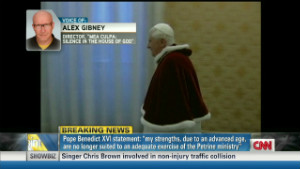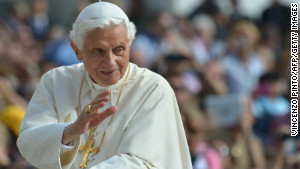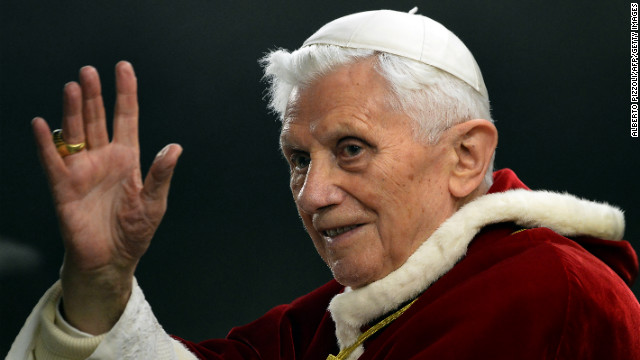It's the first time a pope has stepped down in nearly 600 years.
"Strength of mind and
body are necessary, strength which in the last few months has
deteriorated in me to the extent that I have had to recognize my
incapacity to adequately fulfill the ministry entrusted to me," said
Benedict, 85, according to the Vatican.
The news startled the
Catholic world and led to frenzied speculation about who would replace
him, including a debate about the merits of naming a pontiff from the
developing world, where the church continues to grow, versus one from
Europe, where it has deep historical roots.
 Watch Pope Benedict XVI resign
Watch Pope Benedict XVI resign
 Gibney: Abuse defines Benedict's papacy
Gibney: Abuse defines Benedict's papacy
 Pope Benedict and the sex abuse scandal
Pope Benedict and the sex abuse scandal
But that decision will
not be made by Benedict, who will leave his post at 8 p.m. on February
28, said the Rev. Federico Lombardi, a Vatican spokesman.
"Before Easter, we will have the new pope," he said.
While Benedict won't be
directly involved in his successor's selection, his influence will
undoubtedly be felt. He appointed 67 of the 117 cardinals that -- as of
Monday -- are set to make the decision.
The number of electors
could drop to 115, as two cardinals will turn 80 in March, when their
age makes them ineligible to cast a vote. More than two thirds of
whatever the final number must agree on the next pope, a decision that
will be announced to the world in the form a puff of white smoke
emerging from a chimney in the Vatican.
CNN Senior Vatican
Analyst John Allen said that means the next pope, no matter where he is
from, will probably continue in Benedict's conservative tradition, which
has seen the church take a firm line on issues such as abortion, birth
control and divorce.

No comments:
Post a Comment
Note: Only a member of this blog may post a comment.